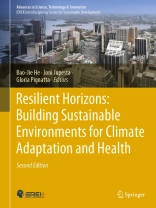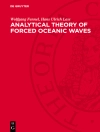This book discusses the challenges related to climate change mitigation and adaptation. It adds valuable strategies and insights into the development of new practices solving the identified social and economic problems related to ecosystem deterioration and anticipating other disasters related to climate change. As the decarbonization of cities and communities became an issue of great interest to many researchers, the book in hand is of great importance to decision-makers and energy stakeholders and others seeking a more resilient and sustainable future and developing innovative technologies to overcome environmental deterioration.
This book is a culmination of selected research papers from the first version of the international conference on ‘Climate Change and Environmental Sustainability’ which was held in 2022 in collaboration with Chongqing University, China.
Inhaltsverzeichnis
A Practical Urban Habitat for Living in the Extreme Drought Conditions of the Future, Using Advanced Wastewater Recycling Technologies.- Risk assessment of green reuse of abandoned industrial buildings#A case of steel mill.- Adaptation of plant ecosystems to rapid climate change in the Ural region: Carbon fields – the most important arena for assessing climate change in the Urals.- The Healing world from 2020 onwards.- Climate Determinants of Health.- Pedestrian conditions from a climate change vulnerability perspective in low income communities.- Effects of climate change on human security and sustainable.- Role of Value Orientation and Belief in shaping Indian Pre-Service Teachers‘ Personal Norms to address Climate Change.- Urban energy consumption in the City of Naples (Italy): a geographically weighted regression approach.- Mechanical Properties and Impact Resistance of Steel Fiber Reinforced Fly Ash and Nanosilica Concrete.- Nonintrusive Load Monitoring System for Decarbonization of Built Environment Based on Deep Learning Algorithm.- Sustainable Renovation on Aosta Residential Building for Carbon Neutrality.- Sensitivity Analysis Using Standardized Regression Coefficients of Roof Design Variables for Energy Performance in Residential Buildings.- Study on the Effect of Adding Biochar to Green Roof Substrate on Carbon Dioxide Reduction.- Features of ESG risk management in the implementation of megaprojects: the Belt and Road Initiative.- Informatic analysis and review of literature on the optimum selection of sustainable materials used in construction projects.- Assessing air pollutant distribution and its influencing factors in the urban street canyon environments.- Sustainability, and Post-Covid 19 Era: Changing Housing Design and Models in the Cities and Istanbul.
Über den Autor
Baojie is Professor of Energy and Sustainable Built Environment at School of Architecture and Urban Planning, and the leader of the Centre for Climate-Resilient and Low-Carbon Cities, Chongqing University. Baojie is Research Fellow at Network for Education and Research on Peace and Sustainability, Hiroshima University, Japan. Baojie was Postdoc Research Fellow, Research Associate, and Ph.D. Researcher, UNSW Sydney, Australia. Baojie is working on the technologies of Cool Cities and Communities and Net Zero Carbon Built Environment. Baojie has published about 100 peer-reviewed papers in high-ranking journals and delivered invited talks in reputable conferences. Baojie has a H-index of 40 (Scopus). Baojie has been involved in large research projects on energy and built environment in Australia. Baojie has been invited to act as Topic Editor in Chief, Leading Guest Editor, Associate Editor, Editorial Board Member, Conference Chair, Sessional Chair, and Scientific Committee of a variety of reputable international journals and conferences.
Dr Joni Jupesta rejoined UNU-IAS in 2023 as a Research Fellow and Academic Associate. He started his academic career firstly at UNU-IAS as Postdoctoral Fellow (2010-2013) and later became Visiting Research Fellow (2013-2016). From 2020 to 2023, he was Senior Researcher in System Analysis Group at the Research Institute of Innovative Technology for the Earth (RITE) in Kyoto, Japan where he focused on mid- and long-term net-zero GHG emissions through Carbon Dioxide Removals (CDR), Carbon Capture, Utilization, and Storage (CCUS), and Low Energy Demand (LED) across sectors. Dr Jupesta gained industry experience as Senior Manager on corporate GHG emissions at Sinar Mas Agribusiness and Food Company based in Jakarta, Indonesia (2013-2020). He graduated his Ph D in Management Science and Technology from Tohoku University in 2010, and MBA in International Industrial Management from Esslingen University of Applied Science in 2006. He has received several awards for his research work, such as the Green Talent Award 2012 from the German government and the Mitra Award 2013 from the Asia Pacific Network on Global Change Research (APN-GCR), among others. Dr Jupesta is an editor for Carbon Capture Science and Technology (Elsevier) and Data and Policy (Cambridge University Press) journals. He was a Lead Author of the Intergovernmental Panel on Climate Change (IPCC) 6th Assessment Report on WG III Climate Change Mitigation (2018-2022). In 2023 he was elected as Task Force Bureau Member on National GHG Inventories of Intergovernmental Panel on Climate Change (IPCC) for its 7th cycle (2023-2030). Since 2023 he became Technical Expert of United Nations Framework Convention on Climate Change (UNFCCC) and Scientific Advisory Group (SAG) Member of Science Based Targets initiative (SBTi). During his 15-year career in think tanks, academia, and the private sector, he has published three edited books, over 40 journalarticles and book chapters, and more than 30 international conference proceedings. H-index 10 by Google Scholar as of June 2023.
Dr Gloria Pignatta is Scientia Lecturer (Assistant Professor) and High Performance Architecture (HPA) Research Cluster expert in the School of Built Environment, Faculty of Arts, Design and Architecture at the University of New South Wales (UNSW Sydney), Australia. She is also Investigator at the UNSW Material and Manufacturing Institute (MMFI) and, in 2021, she was nominated City Futures Research Centre (CFRC) Fellow. She received a Ph.D. degree in Energy Engineering from the University of Perugia, Italy, in 2016. In the same year, she was Postdoctoral Fellow at the Inter-University Research Center on Pollution and Environment “Mauro Felli‘ (CIRIAF), University of Perugia, Italy, working on European H2020 projects where she gained real-world design, construction and thermal-energy monitoring experience at settlement level. From 2017 to 2018, before joining UNSW, she worked as Postdoctoral Associate and Building and Construction Expert at the Singapore-MIT Alliance for Research and Technology (SMART), in Singapore. In 2023, she received the Graduate Certificate in Management from UNSW AGSM. She is the Australian representative for the Annex 83 on Positive Energy District (PED) supported by the Energy in Buildings and Communities Programme (EBC) by the International Energy Agency (IEA). She is an expert in building energy efficiency and sustainable solutions for the built environment. Her research touches on different fields, from engineering to architecture, material science, and urban climate, and aims to face the global problem of climate adaptation and mitigation, but also social challenges, such as energy inequality. She has been actively engaged in research and Ph D supervision and contributed to the knowledge and literature with more than 40 peer-reviewed papers in high-ranking journals, 3 books, and numerous international conference papers and book chapters. Dr Pignatta has been invited to act as Editor for Energy Nexus (Elsevier) journal and Conference/Sessional Chair in several international conferences. She is also Guest and Topic editor in a number of Q1 and Q2 journals. Her collaboration network touches different countries: Italy, Cyprus, Greece, Denmark, UK, France, Germany, Spain, Singapore, Sweden, USA, Canada, India, and Australia. H-index 18 by Google Scholar and 15 by Scopus as of September 2023.












